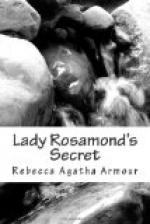With the warm breath of nature came awakening life into the emaciated frame of the invalid. Lady Rosamond devoted every waking moment to her husband. In the charming eventide they sat upon the balcony of their residence overlooking the Corso, catching a glimpse of the open country beyond the surrounding mountains and the ever restless Tiber. Frequently, they rode slowly along the Appian Way, now almost impassable for heaps of rubbish, mounds, and broken fragments, temples, columns, pillars, and successive piles of neglected relics. The Campagna, in its dreary aspect, often tempted their stay. Sometimes her ladyship would have a feeling of vexation, knowing that it was utterly impossible to visit more of the sights of Rome. They might remain for years and leave many scenes unexplored. The palace of the Vatican formed a life-long study for Lady Rosamond. Only a few of its four thousand rooms could be visited, yet these were bewildering in variety. Here they could view the most wonderful collections of art and grandeur that the world affords. Here were stored the endless piles of antique trophies of every clime—rooms representing oriental scenes throughout, starlit skies, and monsters of unknown existence meet one on every side and fill the mind with awe.
For the benefit of the reader we will insert the letters written by Lady Rosamond to her friend, Mary Douglas, containing a short description of some important places, and showing the tender interest inciting the writer when referring to the circumstance of her husband’s ill health—the hopeful vein which pervaded throughout, and the true spirit of friendship extended to the absent one.
Rome, February 10th, 1831.
My Dearest Mary:
As many miles lie between
us there is no alternative but the
hastily written and
imperfect scribble which will shortly be
presented you, if the
elements have not conspired against us.
In order to relieve your uneasiness I beg to state that Gerald’s health is daily improving. He has much faith in Rome. Scarcely a day passes without his enjoying the benefit of the delightful atmosphere and the lovely drives out into the open country, of which I must tell you afterwards. The large number of acquaintances formed since our arrival have contributed much to our enjoyment. We frequently meet many of our old friends. Imagine our delightful surprise on seeing Captain Crofton, his wife and daughter. Of course you remember the latter—a lovely girl of purely blonde style, whom we meet at Lady Berkeley’s, and who created such sensations in London circles on her first appearance in society. Gerald declares that the face of an old friend is better than medicine. What do you think he would say were you to enter rather suddenly upon us? My dearest, I know what I would say if such an overwhelming happiness were in store. These thoughts call up feelings which are inimical




